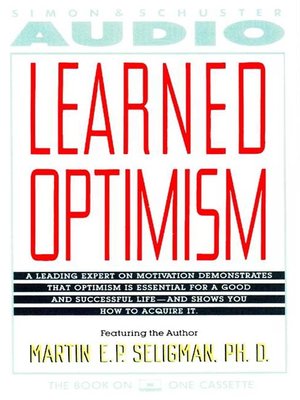

Pessimism encourages depression, therefore is associated with a weak immune system.If given the chance, Seligman and I would vote for optimism. To pessimistically take on inappropriate responsibility in the extreme is a sure formula for depression. Interestingly, in this facet of human behavior, I tend to think and act pessimistically by accepting more responsibility for an event than is warranted. The danger of extreme optimism is the tendency to avoid responsibility for one’s part in an unsuccessful event. (“They are so stupid they don’t know a good thing when they see it.”)

It’s all my fault.”) Meanwhile, those with optimism tend to blame other people or circumstances outside themselves. (“They think they are worthless, talentless, and unlovable.” They say things like, “I’m stupid. Seligman describes how pessimists tend to internalize responsibility when circumstances are negative.

The optimist believes that bad events have specific causes, while good events will enhance everything he does the pessimist believes that bad events have universal causes and that good events are caused by specific factors.” Internal versus External It is a problem when any strength or quality is taken to an extreme.Īs Seligman states, “The optimistic explanatory style for good events is opposite that for bad events. (“With my talent, uniqueness, flexibility and charming character, I will continue to attract clients.”) Did I mention that optimists can be a tad irritating? But so can pessimists. My competitor didn’t know what she was doing, so I got the contract.”) That’s when optimists give a permanent explanation based on their character or abilities. The pessimistic explanation for happiness is temporary. While pessimists tend to generalize their disappointments (“All politicians are crooked.”), optimists focus on specific incidents of displeasure (“Bill Clinton lied to us about his zipper being zipped.”). I’ll always be at the bottom of the garbage bin.”) Their optimistic neighbor, with the mantra of, “This too shall pass,” speaks with words like “sometimes” and “recently.” (“Hey, so what? I sometimes make mistakes, but I learn from them.”) Some people find optimists a tad irritating. Pessimists use words like “always” and “never.” (“I’ll never succeed. Seligman describes pessimism as a habit of explaining painful life happenings as permanent, all-encompassing and personal. My favoritism may show in the following and I admit it delights me to have my bias confirmed. Meanwhile, those with a hefty dose of optimism tend to experience their pessimistic friends as discouraging and gloomy. Those with a more pessimistic attitude tend to call those with optimism naïve and out of touch with reality. If you have ever wondered if you lean towards optimism, which in itself is a great way to relieve stress or if you lean towards pessimism, which is an effective way to increase stress, I encourage you to read on.
LEARNED OPTIMISM HOW TO
In 1990, Martin Seligman released his groundbreaking book, Learned Optimism: How to Change Your Mind and Your Life. I have occasionally been accused of behaving Pollyannaish or overly optimistic, his work is of interest to me.


 0 kommentar(er)
0 kommentar(er)
